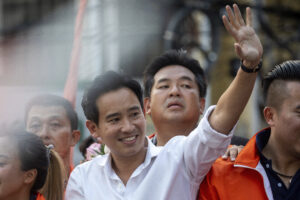The Making of the President: 2062
It was Yogi Berra who supposedly said, "It's very hard to predict things, especially about the future."
LOS ANGELES — It was Yogi Berra who supposedly said, “It’s very hard to predict things, especially about the future.” But then he also said, “I never really said all the things I said.” He even talked about politics and the presidency: “You know Texas has a lot of electrical votes.”
A group of five students at the Annenberg School for Communication and Journalism at the University of Southern California, where I teach, took up the challenge when they chose to do a project on what election coverage would look like 50 years from now. Their names and hometowns answer part of that question: Matt Hamilton from Wilmington, Del.; Shunqi Lin from Shanghai; Melissah Yang from Orange County, California; Byron Tseng from Hong Kong and Angelina Velasquez, who grew up in Southern California and Sicily.Before talking about their predictions for the political and journalistic landscape of 2062, it is worth remembering that 50 years can be a very long time — going backward would take us to 1962, a very different time for both politics and journalism, and even different for technology. That, after all, was the time of typewriters, carbon paper, mimeograph machines and dial telephones.So here is some of what first-year graduate students thought would happen in the next 50 years:“Let’s first examine what we mean when we say election night: a tradition that is not so much a tradition as the latest iteration of political journalism. Election night is, or has been, primarily a television event … networks’ stable of stars gather round tables, report in from swing states and party rallies, monitor incoming poll numbers, stand before maps as the Electoral College votes are selected. … The victor emerges and addresses the nation….“Cue the credits.”Obviously that is going to change. Viewers, or as the students say now, “the audience,” will have all the network tools in any number of devices from handheld to big screens of their own.“On the media end: digital media, user customization, audience interaction, and the ever-increasing rapidity of the media are disrupting the foundations of election night,” they write. “The shared experience of digesting election results through television has given way to a multiplicity of means to learn about and stay abreast of the electoral outcomes. … Digital technology continues to insinuate itself in all facets of our lives: financial, commercial, medical matters, romantic, social, and professional information and communication.”© 2012 UNIVERSAL UCLICK
Your support matters…Independent journalism is under threat and overshadowed by heavily funded mainstream media.
You can help level the playing field. Become a member.
Your tax-deductible contribution keeps us digging beneath the headlines to give you thought-provoking, investigative reporting and analysis that unearths what's really happening- without compromise.
Give today to support our courageous, independent journalists.






You need to be a supporter to comment.
There are currently no responses to this article.
Be the first to respond.